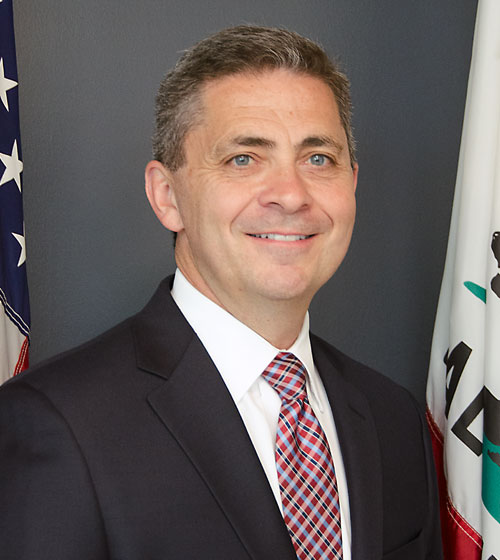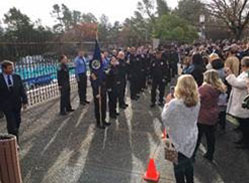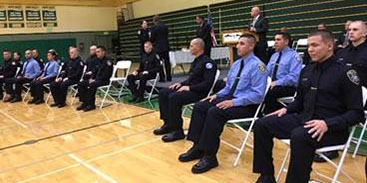
December 2018
EXECUTIVE DIRECTOR’S MESSAGE
 By Manny Alvarez, Jr.
By Manny Alvarez, Jr.
The year of 2018 was all about change. In January 2018, Mission Consulting released an organizational study of POST. As a result, in the Spring of 2018, we made a series of organizational adjustments to implement many of the recommendations in the report. We also identified six priorities to help the agency move forward over the next couple of years:
- Leverage technology in everything we do
- Increase training opportunities for our stakeholders and employees
- Promote fiscal responsibility
- Update our POST Policy Manual
- Modernize basic training and POST legacy courses
- Vision for the future
The new budget was signed by Governor Brown at the end of June. The budget did not include any further cuts to POST, as anticipated when the Proposed Budget was first released in January. Additionally, we received an extra $25 million in General Fund monies to be used over the course of three fiscal years. The funding will cover Fiscal Years 2018-19, 2019-20, and 2021-22, for additional de-escalation and crisis intervention training, as well as “Innovations” training grants. The added funding was a great start to the new fiscal year. We finalized and approved bureau budgets by the end of July. The budgets allow each bureau to have flexibility to spend monies and ensure we do not overspend our budget authority. Aside from setting levels for operational and travel expenditures, each bureau budget included a line item for staff training.
We made significant administrative strides. Many POST bureaus created or updated desk and administrative manuals. In February, we received POST Commission approval to pilot de-escalation, procedural justice, and tactical casualty care at three basic academies. The basic academy pilot will be introduced at Allan Hancock College, Santa Rosa Junior College, and San Bernardino County Sheriff’s Department in January 2019. We embarked on a project to revise over 100 internal policies. We hired over 30 new POST staff. The Administrative Services Bureau distributed almost $20 million in Local Assistance reimbursement payments to city and county governments. The Computer Services Bureau completed the electronic TRR project or what we are calling “eTRR,” which will fully automate TRR reimbursement. We beta tested eTRR starting in November 2018, and it will roll out to all agency stakeholders during the first few months of 2019.
POST owes a debt of gratitude to the following staff upon their 2018 retirement, and we look forward to their continued connection to the POST family:
- John Huynh, Computer Services Bureau
- Linda Sabella, Computer Services Bureau
- Deanna Takahashi, Administrative Services Bureau
- Eddie Russell, Administrative Services Bureau
- Michelle Neal, Administrative Services Bureau
- Marie Del Real, Administrative Services Bureau
- Lynda Dotson, Training Delivery and Compliance Bureau
- Susan Potter, Training Delivery and Compliance Bureau
- Valna Wilson, Training Delivery and Compliance Bureau
- Gary Manini, Training Delivery and Compliance Bureau
- Charles Sandoval, Training Delivery and Compliance Bureau
- Al Benitez, Training Program Services Bureau
- Jan Myyra, Learning Technology Resources Bureau
We have great expectations and look forward to 2019!
POST ATTENDS CLASS 106 GRADUATION FROM NAPA VALLEY COLLEGE POLICE ACADEMY
Training, Delivery and Compliance Bureau Senior Law Enforcement Consultant Eddie Freyer and Bureau Chief Ralph Brown enjoyed watching Class 106 graduate from the Napa Valley College Police Academy on December 15, 2018. Attendance was plentiful. Academy Director Damien Sandoval did a masterful job of being the host and emcee. Many of the 25 graduating recruits will be working for the State of California Department of Motor Vehicles, Brentwood Police Department, Vallejo Police Department, Brentwood Police Department, Concord Police Department, and others. POST staff were recognized for continuous support of the Regular Basic Course and maintaining high standards for the law enforcement profession.



INSTRUCTOR RESUME BUILDER/MANAGER WEBINAR
On January 9, 2019, POST Staff hosted an Instructor Resume Builder/Manager Webinar at POST Headquarters in West Sacramento. The webinar provided instructional training to Basic Academy and In-Service Training Staff on how to use the Instructor Resume Builder/Manager program to aid in developing and managing instructor resumes. The webinar was conducted in a bifurcated manner where an online audience of approximately fifty attendees logged/phoned into the webinar, and a live audience of approximately twenty-five POST staff attended.
Questions regarding the Instructor Resume Builder/Manager Webinar may be directed to Senior Law Enforcement Consultant Rosanne Richeal, Basic Training Bureau, at (916) 227-4260 or Senior Law Enforcement Consultant Julie Gorwood, Basic Training Bureau, at (916) 227-3915.
UPDATE OF SWAT OPERATIONAL GUIDELINES AND STANDARDIZED TRAINING RECOMMENDATIONS
Penal Code Section 13514.1 directs the Commission on POST to develop and disseminate guidelines and standardized training recommendations for law enforcement officers, supervisors, and administrators, who are assigned to perform, supervise or manage Special Weapons and Tactics (SWAT).
These guidelines address legal and practical issues of SWAT operations, personnel selection, fitness recommendations, planning, tactical issues, safety, after-action evaluation of operations, logistical needs, uniform and firearms recommendations, risk assessment, policy considerations, and multi-jurisdictional SWAT operations. The existing guidelines were last revised in 2006.
The Management Consulting Projects Bureau (MCPB) has begun a comprehensive review and update of these guidelines. MCPB staff will be reaching out to current SWAT/tactical team practitioners and trainers to assist with answering the following:
- What do the guidelines have and still need? – Validating what information currently contained within the document continues to be necessary, pertinent and essential.
- What do the guidelines don’t have but need? – Identifying the “holes.” Tactical operations have evolved in the 12 years since this document was published. What are the guidelines missing and what information needs to be updated?
- What do the guidelines have but don’t need? - Identifying information that should now be considered obsolete and eliminated.
Questions regarding SWAT Operational Guidelines and Standardized Training Recommendations may be directed to Senior Law Enforcement Consultant Robert “R.C.” Smith at (916) 227-4864.
LEARNING TECHNOLOGY RESOURCES CONTRACT AWARD FOR RACIAL AND IDENTITY PROFILING UPDATE TRAINING SELF-PACED COURSE
The Learning Technology Resources Bureau (LTR) has awarded a contract to Candent Learning Solutions to design and develop a self-paced course for Racial and Identity Profiling Update training to be hosted on the POST Learning Portal.
The course will be available to help California law enforcement officers meet mandated refresher training to keep them current on racial, identity, and cultural trends and policing in a diverse community, including concepts of implicit bias and procedural justice.
The project will kick-off in January 2019. Questions or comments regarding this project may be directed to Catherine Bacon-Davis at (916) 227-4546.
POST CONTINUES UPDATE OF THE ENTRY-LEVEL LAW ENFORCEMENT TEST BATTERY
The project to update the POST Entry-Level Peace Officer Test Battery (PELLETB) continues. In early December 2018, an item writing workshop was held in West Sacramento at POST. Subject matter experts convened to create items for a new test battery. POST extended invitations for this workshop to the law enforcement and education community with item writing and English/Language Arts skills.
The next workshop will be held in West Sacramento at POST, January 8-10, 2019. This workshop will continue to focus on creating new test items for the test battery.
Questions regarding the workshop or the POST Entry-Level Peace Officer Test Battery, please contact Senior Personnel Selection Consultant Tammura Brown, Standards, Evaluation, and Research Bureau, at (916) 227-4826.
TRAINING PROGRAM SERVICES (TPS) ATTENDS LOS ANGELES POLICE DEPARTMENT’S (LAPD) MENTAL HEALTH INTERVENTION TRAINING (MHIT) AND MENTAL EVALUATION UNIT (MEU) DIVISION
On December 3-5, 2018, TPS visited LAPD, spent a day with their MHIT unit, and attended a portion of their three-day Crisis Intervention Training. The purpose was to observe the MEU units’ response to incidents involving patrol officers and subjects suspected of mental/intellectual disabilities or substance abuse disorders.
The MHIT training provides officers with the knowledge, skills and ability to identify people with mental illness and effectively assess, communicate, intervene, manage field encounters and prepare accurate documentation.
For more information regarding M.H.I.T. or M.E.U., please contact Senior Law Enforcement Consultant Mike Radford at (916) 227-3925.
MEET THE NEW POST EMPLOYEES
 Tam Doan
Tam Doan
Senior Accounting Officer
Administrative Services Bureau
Tam Doan comes from the California Conservation Corps (CCC) where she served as a Senior Accounting Officer for 9 months. She joined POST on December 18, 2018 as a lateral hire. Prior to CCC, Tam worked for the California Department of Fish and Wildlife as an Accounting Trainee for 3 years. Prior to the state, she worked in the private sector performing Accounting duties. Tam has a BA Degree from Sacramento State in Management Information Systems.
 Daniel Schmitt
Daniel Schmitt
Law Enforcement Consultant I
Training Delivery and Compliance Bureau
Dan was hired by the San Diego Police Department in 1990. Dan has over 28 years of law enforcement expertise in public safety, criminal investigations, critical incident management, and executive protection. He worked a variety of law enforcement assignments as a Police Officer including patrol, field training of new recruits, special projects and nearly every investigative assignment within the San Diego Police Department. He finished his career with SDPD as a Child Abuse Homicide Detective, and was hired by the San Diego County District Attorney’s Office in 2004.
He spent 14 years with the San Diego County District Attorney’s Office where he promoted to the level of Commander in the training division. He is a Spanish speaker with a degree in foreign language and has numerous awards and citations in very complex investigations.
Dan retired in 2018 and was hired by POST as the Region 10 Law Enforcement Consultant with the Training, Delivery and Compliance Bureau.
 Frank Petropoulos
Frank Petropoulos
Office Technician
Learning Technology and Research Bureau
Frank comes to us from the City of Vacaville recreation department. He worked there for two years and was responsible for events planning, logistics, working with the event organizers, etc. He also has a background working for in-home support services where he assisted the elderly in their homes. As a hobby, Frank does 3-dimensional computer animation. He can create, cities, cars, and people, all in 3D animation. He has an Associate of Arts in Criminal Justice, and a Bachelor of Science in Psychology and is only a few classes away from attaining a Master’s degree in Business Administration.
LEGISLATIVE UPDATE – STATUS OF CURRENT LEGISLATION
The following is Legislation assigned to POST in the 2017-18 session and Legislation of interest to POST and Law Enforcement partners.
View a detailed report on legislative matters pertaining to law enforcement not assigned to POST.
| Bill # and Author |
Title and Summary |
Status of Bill |
|
AB 1888
Assembly Member Salas
|
Peace officers: basic training requirements.
Existing law exempts a deputy sheriff employed by certain counties to perform custodial duties, as specified, from this training requirement as long as his or her assignments remain custodial related. Existing law requires these deputy sheriffs to complete the training course described above before being reassigned from custodial assignments to positions with responsibility for preventing and detecting crime and the general enforcement of the criminal laws of this state. Existing law, until January 1, 2019, exempts a deputy sheriff employed to perform custodial duties from having to retake the training course described above before being reassigned from custodial assignments to positions with responsibility for preventing and detecting crime and the general enforcement of the criminal laws of this state if he or she is continuously employed by the same department, maintains specified skills, and took the training course within the previous 5 years.
This bill would delete the repeal date of this provision, thereby extending the operation of this provision indefinitely.
|
Introduced date: 1/18/2018
Status: Approved by Governor 6/1/2018; Chapter 17
|
|
AB 2327
Assembly Member Quirk
|
Peace officers: misconduct: employment.
This bill would require each department or agency in this state that employs peace officers to make and retain a record of any investigations of misconduct involving a peace officer in his or her general personnel file or separate file designated by the department or agency. The bill would require a peace officer seeking employment with a department or agency to give written permission for the hiring department or agency to view his or her general personnel file or separate file. Because this bill would increase the duties of local law enforcement agencies, it would impose a state-mandated local program. |
Introduced Date: 2/13/2018
Status: Approved by Governor 9/30/2018; chapter 966
|
|
AB 2349
Assembly Member
Chen
|
Humane officers: authorization to carry a wooden club or baton.
This bill would authorize a humane officer to carry a wooden club or baton, under specified terms and conditions, if he or she is authorized by his or her appointing society, and he or she has satisfactorily completed the course of instruction certified by the Commission on Peace Officer Standards and Training in the carrying and use of the club or baton. The bill would also make other conforming changes. |
Introduction Date: 2/13/2018
Status: Approved by Governor 6/1/2018; Chapter 20 |
|
AB 2424
Assembly Member Lackey
|
Peace officers.
Existing law defines who is a peace officer and specifies the powers of peace officers. This bill would express the intent of the Legislature to enact legislation relating to peace officers.
|
Introduced date: 2/14/2018
Status: Died at Desk
|
|
AB 2504
Assembly Member
Low |
Peace officer training: sexual orientation and gender identity.
This bill would require the commission to develop and implement a course of training regarding sexual orientation and gender identity minority groups in this state. The bill would require the course to be incorporated into the course or courses of basic training for law enforcement officers and dispatchers and would require the course or courses to include specified topics, including the terminology used to identify and describe sexual orientation and gender identity and how to create an inclusive workplace within law enforcement for sexual orientation and gender identity minorities. The bill would authorize law enforcement officers, administrators, executives, and dispatchers to participate in supplementary training that includes the topics, as specified, in that course of training.
|
Introduced Date: 2/14/2018
Status: Approved by Governor 9/30/18; Chapter 696 |
|
AB 2876
Assembly Member Jones-Sawyer |
Vehicles: removal and impound authority.
Existing law authorizes a peace officer to order the removal and storage of a vehicle under various circumstances including when the driver is incapacitated or has been arrested, the vehicle is unregistered, reported stolen, or has been used in a crime, or the vehicle is parked in a manner obstructing traffic or blocking access to a fire hydrant. Judicial precedent deems the warrantless removal of a vehicle a seizure subject to the protections of the Fourth Amendment of the Constitution of the United States that is permissible only pursuant to a recognized exception to the warrant requirement. Case law permits removal of a vehicle by a peace officer in furtherance of an officer’s criminal investigation function, such as removing a vehicle used in a crime for the collection or preservation of evidence, or pursuant to an officer’s community caretaking function, such as removing a vehicle to safeguard the vehicle’s contents, to ensure the safe flow of traffic, or to remove an illegally parked vehicle or a public nuisance. Case law has held that those statutory authorities that permit the removal of a vehicle when the driver is arrested are based on community caretaking and therefore may only reasonably be relied upon when the removal is reasonably necessary for a community caretaking reason such as safeguarding the vehicle or ensuring the flow of traffic. This bill would clarify that the removal of a vehicle as authorized by California statute is also required to be constitutionally reasonable based on the specific situation. The bill would additionally provide that removal of a vehicle is only reasonable if it is justified by preventing a hazard to other drivers, protecting the public from unsafe drivers, or preventing theft or vandalism. By limiting the circumstances under which a vehicle may be removed without first obtaining a warrant, the bill would impose a state-mandated local program.
|
Introduced Date: 2/16/2018
Status: Approved by Governor 9/20/18; Chapter 592 |
|
AB 2992
Assembly Member Low |
Peace officer training: commercially sexually exploited children.
This bill would require the commission to develop a course on commercially sexually exploited children (CSEC) and victims of human trafficking. The bill would require the course to include specified topics and components including, among others, recognizing indicators of commercial sexual exploitation, appropriate interviewing techniques, local and state resources available to first responders, and issues of stigma. The bill would require the course to be equitable to a course that the commission produces for officers as part of continuing professional training and include facilitated discussions and learning activities, including scenario training exercises. The bill would require the commission to develop the course in consultation with the appropriate community, local, and state organizations and with agencies that have expertise in CSEC and human trafficking and to include meaningful input from survivors. |
Introduced Date: 2/16/2018
Status: Approved by Governor 9/30/2018; Chapter 973
|
|
SB 978
Senator Bradford
|
Law enforcement agencies: public records.
This bill would, commencing January 1, 2020, require the Commission on Peace Officer Standards and Training and each local law enforcement agency to conspicuously post on their Internet Web sites all current standards, policies, practices, operating procedures, and education and training materials that would otherwise be available to the public if a request was made pursuant to the California Public Records Act. By imposing this requirement on local law enforcement agencies, the bill would impose a state-mandated local program.
|
Introduced Date: 2/1/18
Status: Approved by Governor 9/30/2018; Chapter 978
|
|
SB 1331
Senator Jackson
|
Peace officers: domestic violence training.
Existing law requires the Commission on Peace Officer Standards and Training to implement a training course for law enforcement officers in the handling of domestic violence complaints and to develop guidelines for officer response to domestic violence. Existing law requires the course to include instruction on specified procedures and techniques for responding to domestic violence, including, among others, the signs of domestic violence, and techniques for handling incidents of domestic violence that minimize the likelihood of injury to the officer and that promote the safety of the victim. This bill would require the course to include procedures and techniques for assessing lethality or signs of lethal violence in domestic violence situations.
|
Introduced Date: 2/16/2018
Status: Approved by Governor 7/18/2018; Chapter 137
|
| |
Legislation of interest to POST and Law Enforcement Partners |
|
|
AB 931
Assembly Members Weber and McCarthy
|
Criminal procedure: use of force by peace officers.
Existing law authorizes a peace officer to use reasonable force to effect the arrest, to prevent escape, or to overcome resistance. Existing law does not require an officer to retreat or desist from an attempt to make an arrest because of resistance or threatened resistance of the person being arrested.
This bill would, notwithstanding that provision, require peace officers to attempt to control an incident by using time, distance, communications, and available resources in an effort to deescalate a situation whenever it is safe and reasonable to do so.
Under existing law, the use of deadly force resulting in the death of a person is justified when it was necessarily committed in overcoming actual resistance to an arrest, when it was necessarily committed in apprehending a felon who had escaped from custody, or when it was necessarily committed in arresting a person charged with a felony and who was fleeing from justice or resisting arrest.
Existing case law prohibits the use of deadly force by a peace officer unless, among other criteria, there is a reasonable fear of death or serious bodily harm to the officer or another.
This bill would limit the use of deadly force, as defined, by a peace officer to those situations where it is necessary, as defined, to prevent imminent and serious bodily injury or death to the officer or to another person, as specified. The bill would prohibit the use of deadly force by a peace officer in a situation where an individual poses a risk only to himself or herself. The bill would also limit the use of deadly force by a peace officer against a person fleeing from arrest or imprisonment to only those situations in which the officer has probable cause to believe that the person has committed, or intends to commit, a felony involving serious bodily injury or death, and there is an imminent risk of serious bodily injury or death to the officer or to another person if the subject is not immediately apprehended.
This bill would make a homicide committed by a peace officer justifiable only if the use of deadly force by a peace officer was consistent with the aforementioned provisions.
Under existing law, a homicide is justified when a person is acting in self defense self-defense or defense of another, as specified.
The bill would make this defense unavailable to an officer charged with manslaughter whose actions were such a departure from the expected conduct of an ordinarily prudent or careful officer in the same circumstances as to be incompatible with a proper regard for human life.
|
Introduced Date: 2/16/2018
Status: Senate appropriations (as amended 6/26/18) suspense file |
|
SB 1421
Senator Skinner
|
Peace officers: release of records.
This bill would require, notwithstanding any other law, certain peace officer or custodial officer personnel records and records relating to specified incidents, complaints, and investigations involving peace officers and custodial officers to be made available for public inspection pursuant to the California Public Records Act. The bill would provide that this information includes, but is not limited to, the framing allegation or complaint, any facts or evidence collected or considered, and any findings or recommended findings, discipline, or corrective action taken. The bill would require records disclosed pursuant to this provision to be redacted only to remove personal data or information, such as a home address, telephone number, or identities of family members, other than the names and work-related information of peace officers and custodial officers, to preserve the anonymity of complainants and witnesses, or to protect confidential medical, financial, or other information in which disclosure would cause an unwarranted invasion of personal privacy that clearly outweighs the strong public interest in records about misconduct by peace officers and custodial officers, or where there is a specific, particularized reason to believe that disclosure would pose a significant danger to the physical safety of the peace officer, custodial officer, or others. The bill would allow the delay of disclosure, as specified, for records relating to an open investigation or court proceeding, subject to certain limitations.
|
|

The POST Monthly Report is a monthly status report that informs POST Commissioners and the California law enforcement community of recent progress on POST projects and instructional programs under development, and other information of importance to our mission to continually enhance the professionalism of California law enforcement.
©2018 Commission on Peace Officer Standards and Training | 860 Stillwater Road, Suite 100, West Sacramento, CA 95605
To subscribe to email alerts for POST Monthly Report, please subscribe here.